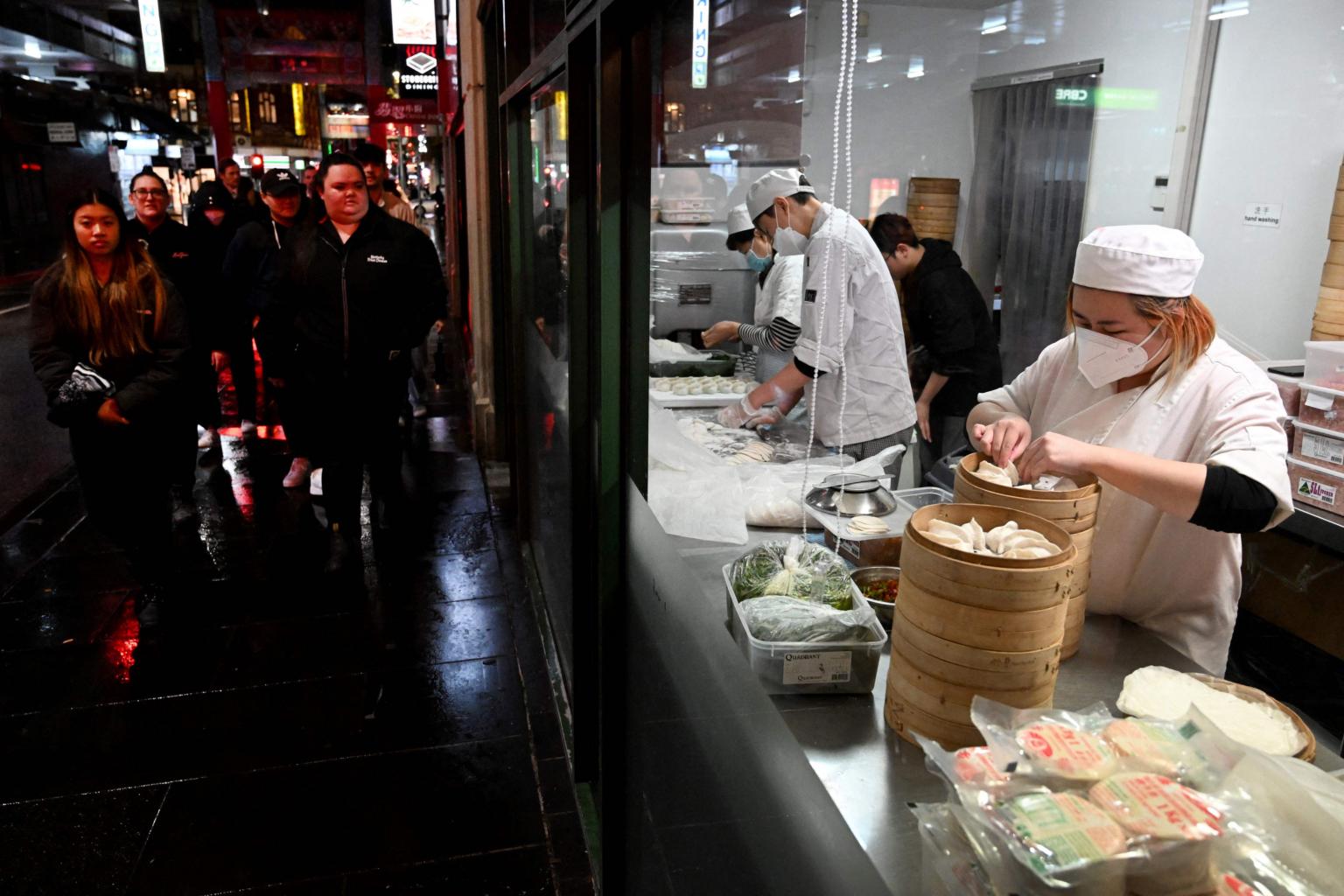Australian PM under pressure to increase migrant intake to address dire worker shortage
Sign up now: Get insights on Asia's fast-moving developments

Restaurant staff making dumplings as people walk past on a street in Melbourne on June 1, 2022.
PHOTO: AFP
SYDNEY - New Australian Prime Minister Anthony Albanese is under pressure to lift the nation's migration intake cap due to a dire shortage of workers that is forcing some businesses to restrict hours and services.
Before the pandemic, Australia easily filled its annual quota, which has been set at about 160,000 permanent migrants a year since 2017.
But Australia's strict international border closures from 2020 until earlier this year disrupted flows of skilled migrants as well as short-term arrivals such as international students and working holidaymakers.
As a result, Australia has experienced a sharp drop in its number of foreign workers, just as its economy has been surging and labour demands are at record highs.
The Australian Bureau of Statistics (ABS) revealed on Wednesday (June 8) that there were about 420,000 vacant jobs across the country, accounting for 2.8 per cent of all jobs - the highest level on record.
Unemployment is currently at 3.9 per cent, the lowest rate since 1974.
Mr Bjorn Jarvis, head of labour statistics at the ABS, said all industries were suffering labour shortages, including the mining sector, where almost 5 per cent of jobs were unfilled, and the financial and insurance services sector, where almost 4 per cent of jobs were vacant.
"The high number of job vacancies shows the strong demand for workers across the economy, as businesses continued to respond to disruptions to their operations," he said in a statement on Wednesday.
The shortage of workers is taking a toll on businesses, which are struggling to fill positions and are having to cut back on hours they can open or projects they can undertake.
Mr Liam Ganley, a bar and restaurant operator in Melbourne, said a lack of staff had forced him to cut down the number of days of opening at two of his venues.
He described offering free flights, accommodation and sponsorship to young working holidaymakers from Britain to entice them to work at his venue, but he received no applications.
"It's harder to trade now than in the middle of Covid-19," he told The Australian Financial Review.
Australia plans to accept 110,000 skilled workers this year and 50,000 foreign family members of residents, but has been struggling to attract and process migrants.
It currently has 96,000 people on temporary skilled worker visas in the country, compared with 195,000 in 2014. In April, more skilled workers left Australia than arrived.
The lack of arrivals has been blamed on the difficulty of competing with other countries for skilled workers, particularly as many people remain reluctant to travel or relocate due to the pandemic.
But Australia has also been experiencing lengthy delays in processing visa applications.
The average wait times for engineering graduates seeking a special 18-month visa is reportedly now 41 months.
Some analysts say more resources and staffing are needed for visa processing.
Mr Albanese, whose Labor party defeated the Liberal-National Coalition at an election on May 21, this week described the backlog of visa applications as "extraordinary", saying that he was urgently seeking to ensure that visa processing times were reduced.
"Upon coming to government, without going into other issues, we have found… we have a problem processing visas," he told reporters.
"There is just an extraordinary backlog."
Business groups have been urging the new government to increase and accelerate the intake of migrants, particularly skilled workers.
National Australia Bank chief executive Ross McEwan said restoring migration was crucial to addressing skills shortages and ensuring the economic recovery continued.
"In my mind, this is one of the most urgent issues that the new government should focus on," he told The Australian Financial Review Banking Summit in late May.
A new economic outlook released on Wednesday by the Organisation for Economic Co-operation and Development (OECD) found Australia's labour shortage to be the second-worst in the developed world after Canada's.
"Skilled immigration will rise following the reopening of international borders in February, but is not expected to be sufficient to materially alleviate the tightness in the labour market," the report said.
The Australian Chamber of Commerce and Industry says the government should increase the intake of skilled migrants to 200,000 people a year.
Mr Albanese has not proposed changes to the cap on migration intake but has promised to hold an employment summit later this year.
The summit is expected to focus on the worker shortage, including efforts to make it easier and faster to bring in migrant workers.


